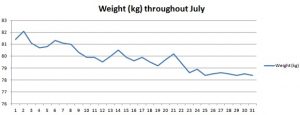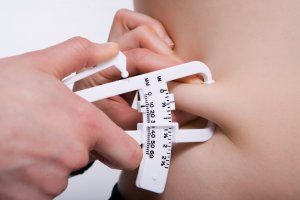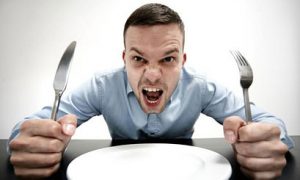You don’t have to look far to find TV commercials, magazine ad, or online guru serving up biggie-sized portions of the perfect fat loss diet.
You know what I’m talking about. Right? Lose 50 pounds in a matter of days. Drop a dress size overnight. Eat this, not that for magical fat loss results. These kind of crash diets that promising unrealistic fat loss results are everywhere.
But there’s one big fat problem with fad diets, starvation eating plans, and extreme calorie cutting. It’s not a sustainable way to lose weight and keep it off.
It’s why an estimated 80 to 95 percent of people who lose weight on a crash diet gain all the weight back. Or worse, pack on even more pounds than when they started following a fat loss diet.
You Hungry, Bro?
If you’ve ever tried to follow an extreme fat-loss diet or know someone who has, you probably know crankiness is involved. Go too long without eating, and your stomach makes it obvious that you’re hungry.
But your stomach also signals your brain to do something about the food situation. At first, it’s nothing more than a reminder that it’s been awhile since your last meal. But the longer you go without eating, the greater the cravings for eating become.
Ever tried to stick to a restrictive calorie plan for days, weeks, or even months?
The typical scenario looks like this. The first couple of days are OK. You feel a little hungry, but ignore it by staying busy or distracting yourself in some way. But after a week or more, the constant presence of hunger is maddening. After a hard day, the stress is greater than your willpower, and you devour a pizza, container of ice cream, and untold liters of soda and sweets.
A fat loss diet that focuses on extreme calorie restriction for long periods of time is a recipe for failure, binge eating, post-diet weight gain, and feelings of failure. And you don’t want to go there.
Brain Science of Fat Loss Failure
So what’s really happening when you attempt to follow a fat loss diet to lose weight? A group of researchers at the University of Cambridge wanted to find out.
They tested the impact of crash dieting on the brain in a lab setting, and here’s what they found.
When the brain gets the message from the stomach that it’s been awhile since the last meal, it activates a group of neurons that regulate appetite in the hypothalamus. And that’s where fat loss starts to fail if you’re going overboard on cutting calories.
In an extreme calorie deficit, the brain begins working overtime to try and compel you to eat something…anything, to give your body needed energy to function.
At first, your body uses fat stores for energy in the absence of glucose from food. It’s what intermittent fasting is an effective way to lose weight. But if you continue fasting, or try and maintain a large calorie deficit, it has the opposite effect.
When your brain recognizes that you won’t be eating that salad, protein shake, chocolate chip cookie, steak, or dessert, your metabolism gets an alert to slow down and conserve all available resources for future energy needs.
This part of the brain served its purpose back when you had to hunt, fish, and harvest your own food and couldn’t guarantee when you’d have your next meal. But if fat loss or a physique transformation is your goal, you’re going to sabotage your efforts on a crash diet.
Fat Loss Strategies That Work
If you’re serious about losing weight and dropping body fat, skip the fad diets, highly-restrictive eating plans, and extreme dieting. Fat loss doesn’t have to be a game of trying to find out long you can suffer.
In fact, fat loss and dieting to achieve your ideal weight and physique goals doesn’t have to be a miserable experience. Here are three ways to achieve your fat loss goals:
1. Lose weight gradually
If you’re significantly overweight or obese, it’s possible to lose 10-plus pounds or more in a week by eating a healthy diet and exercising. But most people should aim to lose 1 to 2 pounds a week.
So if you’ve got 15 pounds to lose, for example, to hit your goal weight, it’s possible to get there in 8 to 12 weeks.

2. Make food choices based on daily calorie goals
If you want to lose weight, you need to eat the right foods. The reality is that you’re more likely to stick to a diet or eating plan when it includes foods you enjoy. Want dessert? Feel the need for a cheat meal?
Go ahead. Just make sure it fits your calorie goals for the day. Making food choices based on maintaining a slight calorie deficit can help you hit your fat loss goals. Need help figuring out how many calories you need to lose weight? Check this out.

3. Track your progress
When you’re driving down the road headed to a new destination, what helps you get there? Probably your smartphone or GPS device. You get real-time data on your speed, direction, route, and arrival time to help you get there.
If you’re chasing a fat loss goal, tracking your progress has a huge impact on helping you be successful. Take body measurements. Step on the scale. Take selfies. And log your progress from day to day and week to week. This makes it easy to notice when you’re headed in the wrong direction, make a course correction and get your diet back on track.

What foods should you eat for fat loss? Whatever foods you enjoy based on a goal for calories and macronutrients per day. That’s going to taste a lot better than any extreme fat loss diet, satisfy your hunger, and help you keep making progress.
Looking for a workout and meal plan to help you lose weight and keep it off?
I have plans that get results for every goal:
Fat Loss (12 weeks) – Lose anywhere from 20lbs-35lbs
Lean Muscle Gain (12 weeks) – Gain Lean Muscle without the Fat
Transformation Plan (8 weeks) – Either Lose Fat Or Gain Lean Muscle



